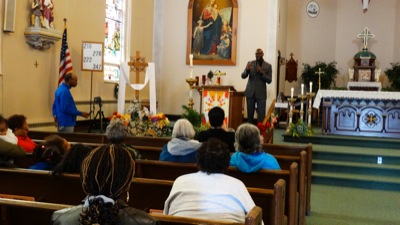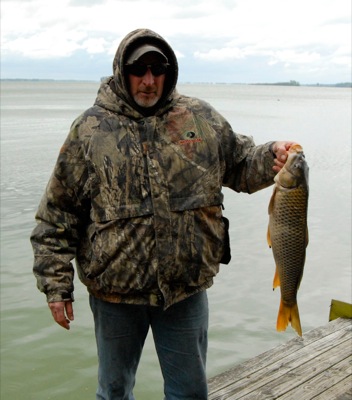Monday, May 16th, 2016
Pilgrimage honors former slaves from Carthagena
By Claire Giesige

Photo by Claire Giesige/The Daily Standard
The Rev. John Scott gives a sermonette at St. Aloysius Catholic Church to members of the Randolph Memorial Pilgrimage. The Saturday pilgrimage honored the history of the Randolph freedmen, a family of freed slaves who settled in and then left the area. Scott spoke of the importance of representing the ugly parts of history along with the good to form an inclusive story.
CARTHAGENA - A group of pilgrims wound their way to St. Aloysius Catholic Church on Saturday to memorialize the Randolph family, freed slaves with a complicated history in the area.
The Randolph Memorial Pilgrimage, which was sponsored by Piqua-based Promoting Recognition of Diversity, visited sites of importance connected to the journey to the Upper Miami Valley made by the Randolph freedmen in 1846.
The pilgrimage began at a location in Piqua where Larry Hamilton of PROD said 1840s newspapers reported the freedmen were greeted with hospitality and tolerance upon their arrival. The pilgrims later stopped in New Bremen where a mob reportedly attacked the Randolphs as they made their way north.
The last stop was Carthagena to visit the site of the black settlement where the Randolphs settled. However, their lands were ultimately lost or stolen and never recovered, Hamilton said.
Hamilton explained the purpose of the pilgrimage was to honor and recognize "those who struggled and went before us." He added an inclusive history of the area is not possible without the Randolphs or the black settlement.
"That story has to be known and acknowledged in a way that honors their sacrifice," he said.
It's a history he hopes Mercer County residents appreciate and are able to discuss, both the good and the bad.
"We hope this is the first part of that," he said.
The Rev. John Scott of True Vine Church in Piqua also spoke at the Carthagena church, reminding the audience that for a history to be accurate, it needs to include everyone who played a part in shaping it. He said the tendency is to ignore the ugly, which leads to repetition.
"For American history to be truly American history, it has to include all Americans," he said. "We have to acknowledge both the contributions and the mistakes."
One member of the pilgrimage came from Columbus. The day had a special meaning for Paisha Thomas, who was raised in Piqua. Thomas is a Randolph descendent.
"This was important to me just because it's a part of my whole story. Learning about my ancestry is very important to who I am as an artist and as a person," she said. "I really wanted to see the land, see what it was like."
Thomas, who learned the details of her family's struggles in the area from Hamilton, said she wanted to see the area her family had made it to before being forced back to Piqua.
Learning more about her history came with a mix of emotions, she said.
"I was glad in finding a settlement in myself that this is the story, this is my history and where I came from," she said. "I was full of emotions at first and now I'm driven to do something solid that changes the narrative from what it was to what it is now."
She was particularly struck by seeing the black cemetery separated from the whole.
"It just kind of brings more of an understanding of why I grew up with that mindset and having that feeling of not belonging," she said. "It teaches me how far back that mindset goes and how much of an effect it can have on the psyche of a black person. It just adds that extra layer."


